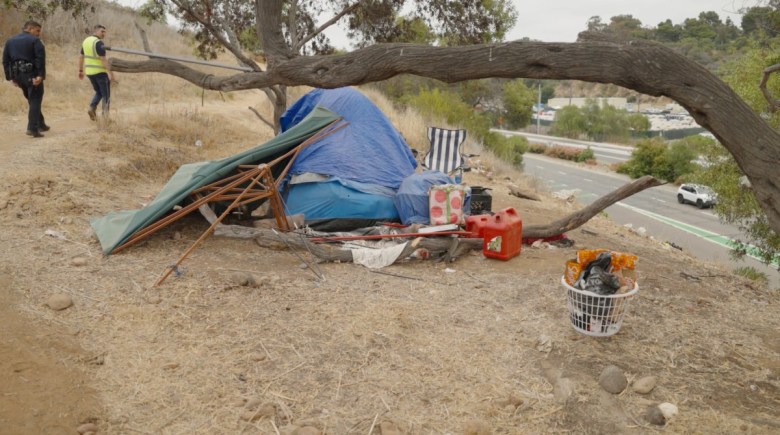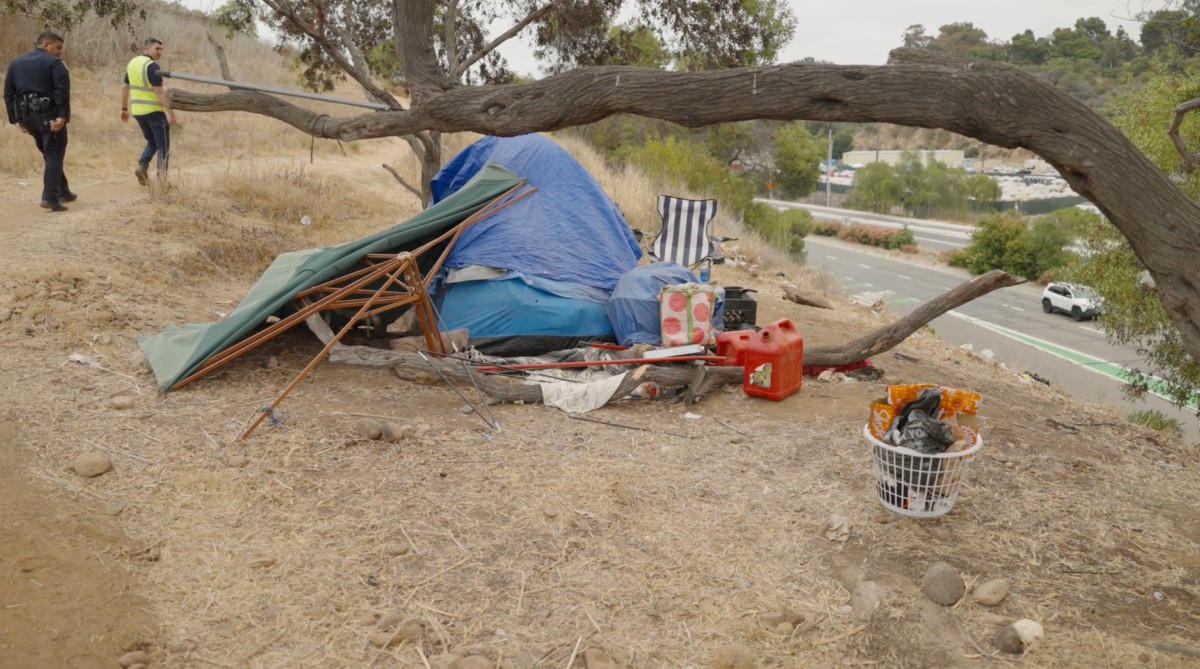 A homeless person’s tent. (Photo courtesy of the city of San Diego)
A homeless person’s tent. (Photo courtesy of the city of San Diego)
At Serving Seniors, we see every day how uncertain life can be for San Diego’s older adults living on the financial edge. Many rely entirely on modest Social Security checks as low as $1,200 a month. In San Diego this is not nearly enough to cover rent, food, and medications.
Federal housing assistance through the Department of Housing and Urban Development provided over the last few years has been a lifeline. Now, that lifeline is in danger of suffering severe cuts.
HUD’s Continuum of Care Program provides grant funding to multiple agencies in San Diego County, including Serving Seniors, to help subsidize rent payments. Low-income tenants who qualify pay no more than 30% of their income.
Through this program, dozens of Serving Seniors clients facing chronic homelessness find safe, stable housing, paired with wraparound support. Our team provides case management, connects clients to healthcare and benefits, and ensures no one goes hungry through our nutrition programs.
People who once slept in cars or on sidewalks can stabilize their lives, regain their health, reconnect, and build community.
Even a temporary interruption of this critical funding would have catastrophic consequences.
Without federal housing assistance, landlords who rely on guaranteed rent payments may evict tenants for non-payment. Once lost, these hard-won housing units will be quickly absorbed by the open market in San Diego. Often, it is harder for us to locate rental housing than to secure the funding for it. Organizations like Serving Seniors will have to start from scratch in a market with too little affordable housing to begin with.
This isn’t an abstract policy issue. It’s about older adults whose lives will unravel if this funding gap occurs. We have invested years of effort and millions of dollars building stability for older adults who were once among San Diego’s most vulnerable. Losing funding would waste the work and taxpayer funds provided to date.
Research and experience show that keeping people housed costs far less than helping them once they become homeless. Each older adult who loses stable housing represents tens of thousands of dollars in potential emergency room visits, public safety threats, and other crisis services, funded primarily by taxpayers.
Serving Seniors is working hard to build new affordable housing. We recently opened our latest project in Clairemont, and we look forward to another affordable housing project opening early in 2026. But we cannot build this housing quickly enough to stem the tide of older adult homelessness.
Shallow rental subsidy pilot programs recently enacted by the city and the county of San Diego work well for older adults who need just a modest amount of financial help to remain housed.
In partnership with the Lucky Duck Foundation and the Rancho Santa Fe Foundation, Serving Seniors has received new funding to assist 20 additional seniors. These foundations are leading through their generous efforts. But philanthropy alone cannot solve older adult homelessness in San Diego County.
Congress has the opportunity to prevent this crisis. Section 166 of Senate Bill 2282 and House Bill 5440 would require the HUD to renew all existing eligible Continuum of Care grants for 12 months through 2026. This measure simply honors past Congressional intent for a two-year funding cycle and prevents catastrophic lapses.
Without Section 166, communities like San Diego could lose permanent housing funding due to bureaucratic changes beyond their control.
We urge our members of Congress including Senators Alex Padilla and Adam Schiff, and Representatives Scott Peters, Juan Vargas, Mike Levin, Darrell Issa, and Sara Jacobs, to include Section 166 in the upcoming continuing resolution. Protecting these programs protects lives. We ask San Diegans to express their concerns and ask for their support for Section 166.
Older adults are the fastest-growing segment of San Diego’s homeless population. They make up 30% of all unhoused residents. Serving Seniors and our partners have made tremendous strides in addressing this humanitarian crisis.
When one older adult loses housing, the effects ripple outward to families, neighborhoods, and the public systems that absorb the fallout. When we keep people housed, everyone benefits.
Our concern goes beyond funding sources. When we provide housing and supportive services, we strengthen neighborhoods and reduce strain on public systems and ensure that every person can age with dignity.
At Serving Seniors, we’ll continue fighting to keep our clients housed, healthy, and hopeful. We ask our community and our elected officials to join us. The cost of doing nothing is measured not only in dollars, but in human suffering.
Melinda Forstey is president and chief executive officer of Serving Seniors.
READ NEXT


